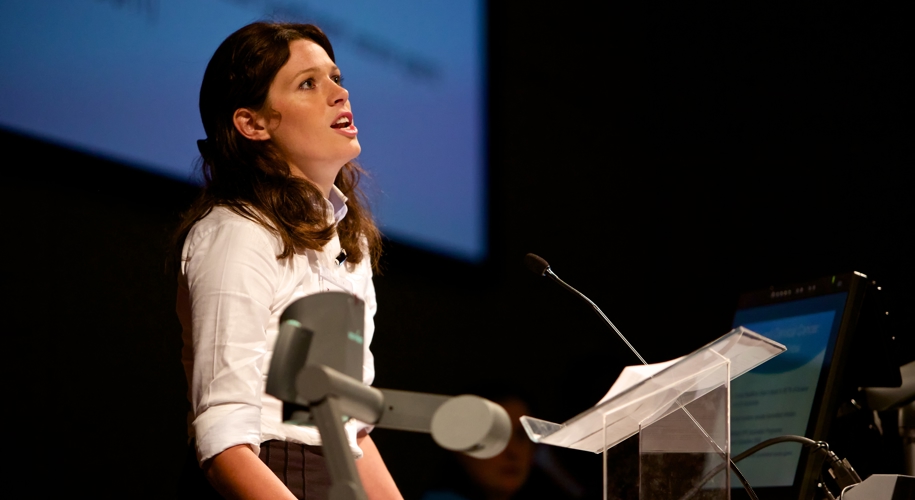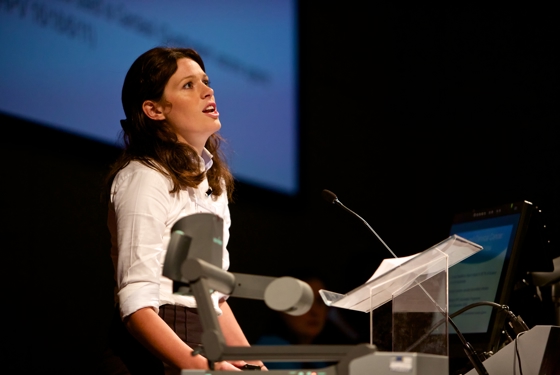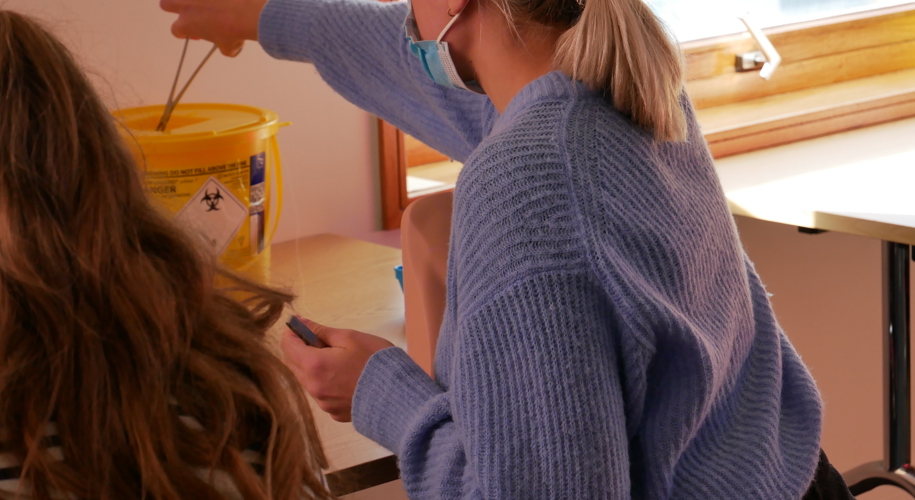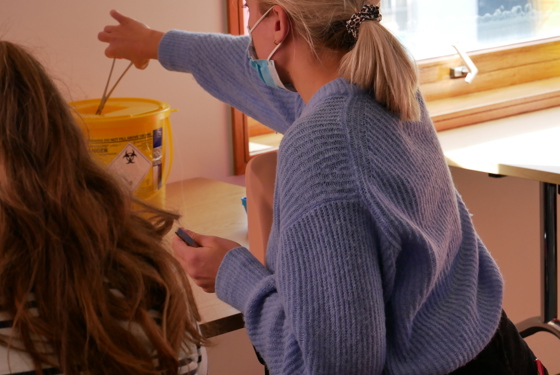These personal profiles will give you a taste of different experiences and different potential career paths in O&G:
- Deciding on O&G as a career
- Foundation doctor’s view
- VSO Fellow
- Academic obstetrician
- Fetal medicine specialist
- Gynaecological oncologist
- Intrapartum care specialist
- Minimal access surgeon
- Endometriosis specialist
- Urogynaecologist
- Paediatric and adolescent gynaecology specialist
- Genitourinary medicine specialist
- Consultant in fetal and maternal medicine
Deciding on O&G as a career
Melissa Whitten
‘As a medical student, O&G was always in my top five of preferred specialties, but I wasn’t really sure until I did it as a job that I wanted to pursue O&G as a career. When I started working as an SHO in O&G, I obviously didn’t know which particular area of the specialty I might want to go into, but the great thing was that there were so many different strands to O&G that I knew I was never going to be bored.
‘While I was doing my SHO jobs, I started to realise that my main interests lay in obstetrics. I spent some time working as a neonatal SHO to complement my O&G training and this really taught me that pregnancy is just the beginning of life – and that the way we look after couples before and during pregnancy can have a huge impact on the life of the newborn child. I pursued my interests in this area and completed subspecialty training in fetal and maternal medicine. I now work as a consultant in obstetrics and fetal and maternal medicine and medical education, combining all the areas that I enjoy most into one job.’
Foundation doctor’s view
Nithya Ratnavelu
‘O&G had not even entered my head until I did a two-month placement in my fourth year, but I found working with women – seeing them first in the clinic and then in theatre – really fascinating. I also discovered that the specialty was so varied, which I don’t think I had fully appreciated before.
‘As a Foundation Doctor, I find there is an excellent support system for junior staff. The rota I work is full shift and compliant so I have time to myself at the end of the day.’
VSO Fellow
Alison Kirkpatrick
Alison Kirkpatrick spent a year in Sumba, Indonesia, as an RCOG/VSO fellow during her specialty training.
‘I have seen some heartbreaking and extraordinary clinical cases and lain awake at night trying to work out the best course of action for patients in abject poverty (who have to pay for all their treatment) who present too late in a hospital with extremely basic facilities. I have come to appreciate more than ever the support and skill of my midwifery and primary care colleagues in the UK. I have developed a huge debt of gratitude to those of my trainers, whose remembered words of wisdom have helped to guide me when the going’s been tough. I have met and mixed with a broad spectrum of people outside the world of UK hospital medicine. Despite the challenges of living and working here, it has been an amazing and thoroughly rewarding experience.’
Academic obstetrician
Deidre Murphy
‘I can honestly say that my sense of satisfaction in providing high-quality care has never diminished and that I never stop learning. It is the additional possibility of improving the outcome for a huge number of women, women I’ll never even meet, that has driven me into academic work as well. There is also a lot of autonomy in academic medicine and I can control my time more flexibly around family commitments. There are also many opportunities to travel through academic medicine. I am fortunate to be invited to teach and lecture at conferences all over the world.
‘O&G is definitely a career path for someone with great energy and flexibility. And it is now a specialty that is entirely compatible with family life and outside interests.’
Fetal medicine specialist
Tim Overton
‘For me it is a real privilege to be able to help pregnant women through one of the most important times of their lives and I have never lost that first flush of enthusiasm. There is rarely a day that goes by when you don’t feel that you have made a real difference to one of your patients. I really enjoy the mix of skills that are required within fetal medicine scanning and in utero needling, some surgical competencies, knowledge of medical problems, as well as the skills needed to explain complex issues often to emotionally distraught patients. Perhaps most of all, however, I enjoy the relationships that you build with your patients and their families during a pregnancy that often continue as they have more children.’
Gynaecological oncologist
John Shepherd
‘Being a part of gynaecological oncology at a time when huge successes and changes in treatment for gynaecological malignancy are being made is tremendous. We are seeing better treatments and survival rates of ovarian cancer, modifications and improvements in the treatment of vulval cancer and at the moment I am helping to develop fertility-sparing surgery in the treatment of cervix and ovarian cancer in young women.
‘These days, the great thing about gynaecological oncology is the rationalisation between surgical and non-surgical treatments. Thanks to a multidisciplinary team approach we can now decide what the best treatment for an individual will be and tailor it accordingly.’
Intrapartum care specialist
Patrick O’Brien
‘I don’t think the thrill of being present at the birth of a baby will ever fade – I regularly see hard-boiled grown men dissolve in tears at the sight of their baby appearing into the world. But perhaps what appeals to me most is that O&G is a wonderful mix of medicine and hands-on surgery – a better mix, I believe, than that provided by any other specialty.
‘I am privileged to work with a team of consultants from various specialties, along with skilled midwives and nurses to provide care to pregnant women with complex medical problems such as diabetes, epilepsy, blood clotting disorders and neurological problems, to name but a few. Perhaps the most challenging group are women with congenital heart disease, many of whom will have had heart surgery in childhood. Pregnancy places extra demands on the heart and, for many of these women, it is a time of considerable risk for them and their babies. In fact, it is only in recent years that such women are surviving into adulthood and becoming pregnant, so this is often uncharted territory. Although the challenges are significant, the rewards are greater.’
Minimal access surgeon
Eddie Morris
‘Minimal access surgery involves converting certain traditional gynaecological operations into ones that involve two or three relatively small incisions. It’s the same procedure but has a shorter recovery time for the same, or sometimes better, outcome. I think to do this sort of surgery you have to be level headed and calm under pressure. The team looks to their leader to be cool, calm and collected at stressful times, skills that training in O&G develops to the full.
‘Minimal access surgery definitely requires the ability to constantly embrace modern developments and then put them into everyday practice. If not, things won’t advance. It’s a subspecialty that is full of innovation and you should not be afraid to share original ideas and thoughts. Whilst I was doing my research I invented a modified device for taking a sample of the lining of the womb in the outpatient clinic. It is now on sale and something of which I am particularly proud. There has to be a willingness to learn within gynaecological surgery and an openness to the fact that you’re always learning.’
Endometriosis specialist
Stephen Kennedy
‘I have spent the last 20 years treating women with endometriosis and researching the disease. I think I have got more enjoyment out of developing expertise in a narrow field that I would have done had I tried to apply much broader knowledge – but that’s a personal preference.
‘Academic medicine provides the freedom to develop this kind of expertise as well as the opportunity to develop new skills and techniques, which can then be applied in a clinical setting. Combining clinical practice with basic research in such a debilitating disease is very rewarding.’
Urogynaecologist
Linda Cardozo
‘The reward of being able to “cure” or improve women with incontinence – who come for their initial assessment demoralised and wearing pads but return after intervention full of renewed confidence – is unbelievably satisfying, and the versatility of my role as head of a tertiary referral urogynaecology department at King’s College Hospital leads to a satisfying career. I divide my time between an NHS clinical practice, a private practice, supervising and undertaking clinical research, lecturing, giving advice to industry, training junior doctors, subspecialty training in urogynaecology, as well as a very full family life. Who could be luckier than that?’
Paediatric and adolescent gynaecology specialist
Anne Garden
‘Paediatric and adolescent gynaecology requires a completely different set of skills from adult gynaecology. The conditions that present themselves are not the same and the communications skills I need to employ are completely different. I deal with the fears and expectations not only of the girl but of her parents as well. Understandably, parents get very concerned about their daughter’s future fertility so it’s like treating the whole family.
‘Dealing with young girls, I also have to watch out for any hidden messages they may be telling me. How can she tell me she might need contraception with her mother sitting there? I try to be sensitive to these matters. Often I’m the first gynaecologist they’ve ever seen and I can’t mess that situation up. It’s a real buzz to get alongside a wee girl who’s terrified but hear her going out the door saying, “She was nice, Mummy”.’
Genitourinary medicine specialist
Colm O’Mahony
‘Taking a sexual history is a fascinating process. Each case gives unique insights into personalities and relationships, and there is definitely a pastoral side to what I do as well: patients can be very distressed because they could possibly have acquired a sexually transmitted infection, and you therefore have to empathise and be sensitive to their needs at a very anxious time.
‘Most conditions are easily diagnosable and usually respond 100% to treatment. Results in genitourinary medicine can be immediate, and that’s what’s so satisfying – how many other specialties can say that? There can also be a bit of surgery if you fancy it, or you can even venture into colposcopy.
‘As genitourinary medicine is largely a clinic-based specialty, the hours are especially sensible. Weekends are usually sacrosanct, with most consultants doing on-call by phone as there is little that can’t be sorted out with advice.’
Consultant in fetal and maternal medicine
Michele Mohajer
‘O&G satisfies the altruistic needs I wanted my career to fulfil. There is a lot of counselling involved in this specialty, particularly when it comes to prenatal diagnosis and ultrasound scanning. I have to talk through many issues and problems with my patients and really listen to their concerns. Of course, there are times when I have to deliver bad news, but you do get used to it: over the years I’ve picked up techniques and now know what to say to parents to make it easier for them.
‘The other main reason why I find O&G so enjoyable is the practical side. It is a lovely combination of all aspects of medical training – surgery, medicine, imaging and counselling. But best of all is that we still use and rely on our hands to tell us what’s going on. So many of the other specialties these days simply rely on test results.
‘O&G has turned out to be entirely compatible with a family life: I have three children and have always worked full time (not that anyone has to!).’
Discover the opportunities offered by a career in obstetrics and gynaecology.
Find out more about a career in O&G
The O&G careers prospectus also includes:
- The medical student experience of O&G
- Foundation training
- Specialty training in O&G
- Research and academic training
- Assessment and exams
- How the RCOG supports and works with trainees
- Working life in O&G
- Personal profiles of O&G doctors
For more information, please visit the main careers page or read the careers FAQs.
Elsewhere on the site


About the College
Find out more about the College and how we support our members


Specialty training in O&G
Overview of the specialty training programme in O&G, including assessment and certification of training
